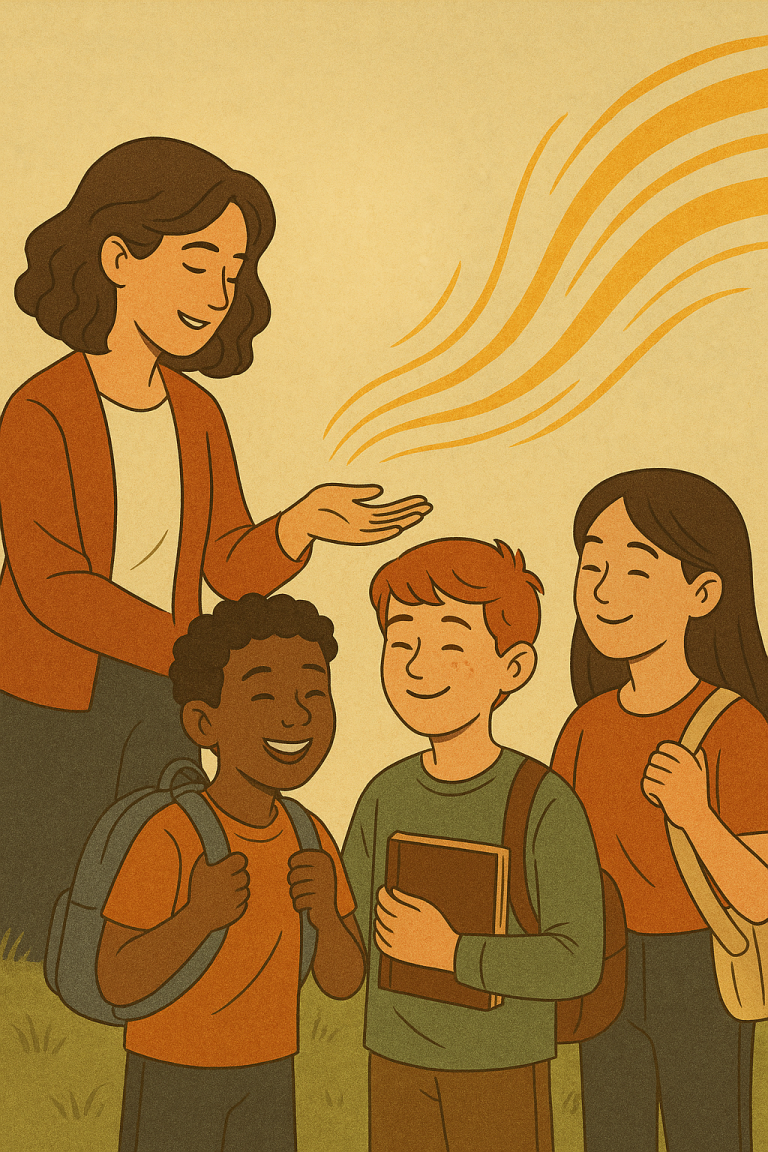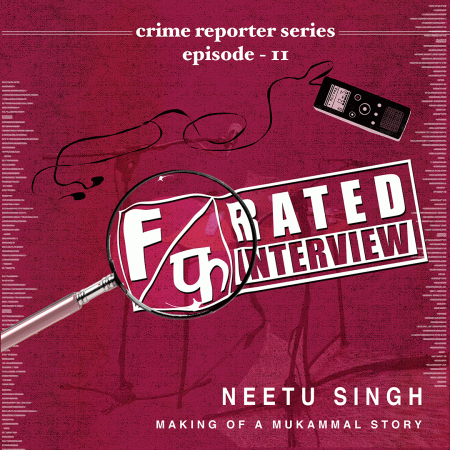I once taught a girl whose laughter made me think of falling water on stones. I recall the sound of it as clearly as I recall how often and how willingly she told me jokes. On the day her friends left on a trip, I asked her, ‘Priskilla, why didn’t you go to Bali?’ She said, ‘Ma’am, my purse was khaali.’
I didn’t even want to hide how brutally my stomach caved. I laughed because her face was full of a familiar comedy I hadn’t yet learnt to expect from students. We sat cackling at my table until we were both hungry. Then we had some tea and she left. I settled down with my very ordinary teaching day, and like Ramanujan’s narrator from Still Life, I too ‘suddenly wanted to look again’, and found only the small echoes of her full laughter. I was also aware, despite Billy Collins’ warning, of my own laughter which had launched itself suddenly from the stomach.
It has been seven years and every time I think about Priskilla or Bali, I still laugh. What the moment offered more than anything else was a sense of surprise.
An invitation to see and be seen differently.
After that evening, every time I saw Priskilla in the corridor with a 1000-watt smile and the mischief of a well-rehearsed joke already electrifying her face, there was something of a flutter in my stomach, a seizing joy that has taken years to feel deserving of. It’s something I don’t freely find anywhere, except in the classroom. It’s here that I get to experience an abandon carefully composed in songs about falling in love. One I have tried and failed at finding language for; an abandon I know Audre Lorde knew in her bones and wrote about with exactness.
When I first met her, in her first year of college, I’d told Priskilla that the age-old kettle in the staff room wouldn’t boil water unless she stared at it. She stood devotedly by the kettle and I returned to my chair, pleased. A few days after she realised she was pranked, she sat up somewhat straighter in my classes and appeared more open to Dorothy Wordsworth than before. I saw that the playground outside the classroom could very well come in if the students were willing to play, and more importantly, if I made the effort to ask them, ‘Will you play with me?’
From the fables, gossip, and stories that the women in my family told each other, I gathered that they were always looking for friends to play with. But whether as young girls or married women, not many wanted to touch them, not even little enough to play with them. My grandmother who dreamt of eating paysa stood outside temples, trying to gather friends. On good days, she was ignored and on bad days, she was asked to specify her kula-gotra, and then told to leave. So, my women invented games where their desire for female friendship didn’t have to be an endless round of humiliation.

They stopped seeking women who didn’t want to touch them.
Up until a certain point in my teaching life, the lack of female friendships was overwhelming.
This gradually dissolved because I became complacent in the knowledge that caste touches friendships more than friends touch each other.
In my world of work, teachers are often told to keep their distance from students. And for good reason. There is perhaps some value in allowing the student to build a relationship with what/how you teach, and nothing more than that. Usually what makes teachers stick to this is the unwillingness to do more, but also the anticipation of the only known danger beyond this territory: an illicit relationship — as if it’s the single, most possible outcome from this kind of love. We continue to be suspicious of love that doesn’t result in a recognisable, nameable, but mostly-controllable entity.
I too kept this boundary for years until greed took over and I began laughing with and pranking students more openly than I did even with the few friendships outside. Slowly, my hunger for female friendships found closure.
After watching Kim Mordaunt’s The Rocket (which is the story of an eight-year-old boy who enters the annual rocket festival, celebrated to appease the gods to make it rain), a class argued with me about why it had to rain at the end of the film. I quoted Sigmund Freud and said, “Freud believed that if it rains at the end of a film, it’s a good film.”
Freud said no such thing, but this was a decade ago and I was under the impression that you weren’t a teacher unless you could name-drop a couple of dead white men. The way the class looked at me? Full comedy. Some couldn’t believe that a teacher could lie so shamelessly. A few girls, perhaps three, looked right at me — through my soul — laughed, rolled their eyes and called me a liar.
That moment still makes me giggle. It fertilised friendships with some very special girls, friendships I still have today.
I told the same lie in class last month and this time I didn’t have to wake up Freud. They believed me.
I have a German war-cat named Dominique Broteadeu.
Some students believe me, some refuse to imagine anyone would put this much effort into an obvious lie, but most are curious about Dominique. A boy who only liked to sleep in class came to see Dominique at my table week after week because he believed me when I told him that the cat was there every Saturday afternoon. For seven Saturdays after that, sometimes even after I’d scolded him for not doing any work in class, he’d come to my table with wide eyes and gesture with his hands, “Ma’am. Dominic?” After this little game, even if he was diligently daydreaming in class, he smiled when he saw me and pretended to read Joe Sacco. From what I’ve been able to gather so far, boys believe in Dominique more easily than girls. I don’t know what this means.
But it’s with these lies that I cannot stop telling, that I continue to play with students year after year.
And it’s fascinating how much they want to play, whether or not they believe in Dominique Broteadeu.
***
It wasn’t always like this. For a while, the classroom was a battlefield, a place where I had to prove worth and other important sounding things, build a self that could be respected, and learn not to lose it every day because I lost it so often, making it a place I dreaded. I was terrified of asking if anyone wanted to play and be met with silence. 13 years later, I see that maybe teaching is about silence, and the risks that students and teachers both collaborate on in breaking and unbreaking it. Until we can all play together.
In some cases, what makes this game achievable is the Language classroom.
When I was younger, I’d occasionally run into a Science or ‘max’ teacher at a restaurant and seeing them the next day in school would shift reality in some way. They’d suddenly become human. Even if it was brief, I’d inadvertently end up paying more attention to how they drank water, what earrings they wore, their daring and risque weekend blouses, how they held the chalk and what they said.
It occurs to me now that I’ve never had to meet an English teacher outside the classroom to make them human.
They seemed more willing to play than others, more open to talking about their fears and dreams, and just as open to listening. Even as I write this, I am thinking of teachers regardless of what they teach, so broken in spirit and oblivious to life that they kill students, some by making Dalit children clean toilets, some others by refusing to move beyond themselves. Both are versions of an extremely Brahmanical mind. Practitioners of such a mindless and criminal use of the classroom are blind to magic or play.
As students, we used to be powerlessly preoccupied with the personal lives of our teachers. It’s only when I became one did I see that it’s truer the other way around. To be curious about a student’s life makes teaching human, sensible and a thing of pleasure, a relief from institutional ineptitude. And this is perhaps as good a time as any to ask why this pleasure shouldn’t be erotic. Erotic as Audre Lorde imagined, knew, and wrote about in her essay, ‘Uses of the Erotic: The Erotic as Power.’

“For the erotic is not a question only of what we do; it is a question of how acutely and fully we can feel in the doing. Once we know the extent to which we are capable of feeling that sense of satisfaction and completion, we can then observe which of our various life endeavours bring us closest to that fullness.” – Audre Lorde.
There is something erotic happening when I take Eunice De Souza to a class I am not teaching poetry to because I have come to know, perhaps through gossip or rumour, that a student who used to laugh freely is barely even talking to anybody because some boy has broken her heart. There is certainly something at work if I am pausing the curriculum to be available for a student who has not asked for it, who will probably never know that Eunice was brought to class especially for her. The thrill of reaching someone who didn’t know that the answer to her misery was in keeping cats, of seeing that humbling leap for freedom appear and disappear on her face like the faraway sounds of a train — on any given day, no matter where you find it — is delightful, kind, erotic.
These small detours and liberties become possible to take because of the potent capacity of the language classroom; and because I am an English teacher, I can only really write about the English classroom. When I say English classroom, it is not in opposition to other languages. I mean it in its capacity to offer unique experiences to students, distinct from the sciences and commerce. Away from how institutions see us, in full bloom of the autonomy there is for the teacher and the student, in the way English classrooms can become accessible even to those who don’t know English.
Last month, a former student won a writing award for short fiction. When he went on stage to collect the award, I felt a stab of what the French call ‘jouissance’. A thing of extreme joy that goes beyond ordinary principles of pleasure. I felt it more acutely than what I could have possibly felt if I had won it. In his speech, he took a moment to think about the work teachers had put in to bring him here and I thought back to my first class with him, and his immensely punchable face — full of comedy and a loud madness to write — that I was painfully familiar with.
Watching him win was evidence that work wins when the goal is not winning, but jouissance.
The more I think back to that moment, the more convinced I become that I have never felt jouissance after a Scopus publication. I doubt any teacher feels jouissance after any kind of publication.
At the same ceremony, another student was volunteering to help backstage and she was visibly nervous, waiting for the ordeal to be over. When I saw her, my hands went up in darkness, waving out ‘haiiiiiii’, mutely but loudly. Later she told me that watching me wave had made her feel like a kindergarten student who sees a parent amidst the audience and feels alright again. I had to squeeze the arm of a friend to stop myself from bawling. It made me happy to hear it but only after gutting me out. On my way back home that night, I couldn’t stop thinking about her and the vacant yet immune look she has on her face when she talks about her mother’s passing.
If this counts as shitting where I eat, then maybe it’d be a terrible waste to only eat.
When a colleague left to pursue MFA years ago, her student, miserable without her, spent days walking aimlessly in the corridor until a new teacher joined and reopened the classroom for him. After some light returned to his face, I pointed this out to her, and she told me with a straight face, “It’s nothing. He just imprinted on me after S left.” I giggled because she hadn’t realised how matter-of-factly she had imported a word from another world to explain this. Like many, I too first heard the word in Twilight. I am, even now, very kicked by this analogy. It is rational for this kind of imprinting to occur in the classroom. Students imprint on teachers; teachers too, imprint on students.
I think about what friendships with students do for me. As a thing of destruction, it is inherent in the nature of caste to spoil everything it wants to touch; but I also see that it is just as inherent in the nature of friendship to not allow it to. In this game of touch and no touch, I am somehow left only with the company of girls I teach and once taught. It’s bizarre that the classroom eventually became for me my grandmother’s Kottuncheri; these friendships made up for the loud yet empty playground that adolescence was.
The lesson all along had been to mix pleasure with profession, to play where you work, shit where you eat, despite repeatedly being reminded not to.
Before beginning this column, I made a list of all the girls I’d taught. I got to 62 before I stopped. More might’ve arrived if I had continued, but knowing that this was like a personal attendance sheet of my own which I could access anytime was enough.
I am aware about the dangers involved in doing work like this, attachments all out in the open, easy for anyone to walk in and pee all over. But then I am reminded of a line from the television show The Haunting of Bly Manor. “The work of loving them is worth the pain of losing them.”
I see that we are here, as teachers, to teach, yes, but to return twice the affection that students show us by pouring energy into making them ready for life.
I’d like to see AI mimic this. Not a challenge, bro. Just an observation. Like an uncal who never has a question, but more of a comment.

****
The third and final lie I told was to a girl in 2016 who came to the staff room one day, not for any reason other than to use the bathroom. She had been crying and when I asked her if she wanted some tea, she asked me how long it takes to recover from a heartbreak. I didn’t know what to say. But I wanted her to stay for tea so I said, “Seven and a half books.”
We talked all evening and I pushed her towards reading because I too wanted to see if seven and a half books would do the trick.
I had no idea but because she believed me, there was nothing left to do except make a lie come true.
She returned week after week to eat books with great speed, slowing down by the third book. She had to read just one more before her heart made a full recovery and I returned to reading with more fire than ever because of her. Anything offered kindly and willingly — and received just as kindly and willingly — offers a possibility of the erotic that Lorde writes about.
Sometimes when I watch my students read or write, I become extremely aware of the classroom as a physical space that separates them and me from the rest of the world, beginning with the moment I close the door. I feel fortunate for just being able to close the door because of grand inquisitions that are often conducted outside language classrooms to check whether work is being done at all, whether the student is learning anything at all.
As if learning is always loud and visible and not in the faint surprise on a boy’s face when he is reading Oranges by Jean Little, and arrives at the lines: ‘Emily is my best friend. I hope she never learns how to peel oranges.’ No one investigating from the outside will be able to see how this boy’s slowly unfurrowing eyebrows make room for his quiet smile when he repeats those lines to himself. Only I can see the delight on his face when he looks up, then back at the poem again, his mind wheeling him back in time, making him grateful for the intimacy of a fruit.
As if learning is not the attempt a boy afraid of English makes, as he stands in front of every notice board in the corridor, slowly gathering words, trying to understand them. Those investigating from the outside will never be able to see that even as his lips are moving word to word, his hands too are tracing the shape of these words from deep inside his pockets.
Some learnings do not make noise and cannot be tested in an exam. Their worth comes from hoping and dreaming about a day in the distant future when this student will meet an unusual obstacle and the memory of a poem, its innards, lessons, and sounds will help them smile and wave at the problem. That is the precise function of a language classroom.
That this intimacy is possible in the classroom is perhaps why English departments are viewed with suspicion.
That we have nothing to teach and no ‘portions to cover’, that we always talk about dead things that don’t help anyone with anything, that our question papers could be answered by anybody (as if this is a bad thing) are seen as reasons to not take us seriously.
Someone whose first instinct is to throw cow dung on work they are not familiar with, may never find the grace to see that something of value is being built when 47 students are sitting with a pen in their hands, hunched over notebooks, scratching their heads and writing about the smell of their grandmothers.





